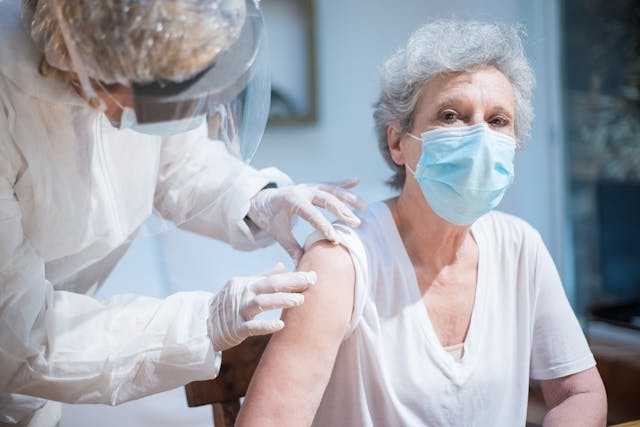A publication in the Journal of American Medical Directors Association (JAMDA) has revealed that nursing home residents who have been fully vaccinated against COVID-19 face a low risk of severe illness from the virus. The research highlighted that individuals aged 85 and older, particularly those with pre-existing conditions such as heart and kidney diseases, were at increased risk of vulnerability. Nonetheless, breakthrough COVID-19 infections among fully vaccinated residents were discovered to be under 10%.
The study analysed the data of 23,172 fully vaccinated nursing home residents across 984 facilities from March to November 2021. It was found that a mere 5% of these individuals developed a breakthrough infection (B.T.I.) of COVID-19, regardless of the variant, within the observed period.
Moreover, it was noted that fewer than 10% of those vaccinated residents who did experience a breakthrough infection necessitated hospitalisation or succumbed to the disease within 30 days, recording a percentage of 8.6%. It was mainly the residents aged 85 and above, with severe infections and specific comorbidities like heart and kidney diseases, who were identified as more likely to experience these outcomes.
Sarah D. Berry, M.D., M.P.H., the study’s co-author and Associate Director at the Musculoskeletal Research Center, as well as an Associate Scientist at the Hinda and Arthur Marcus Institute for Aging Research at Hebrew SeniorLife, stated that the study aimed to assess the frequency of breakthrough infections and severe illnesses among nursing home residents vaccinated against COVID-19.
Dr. Berry elaborated that despite the evolution of the COVID-19 virus, the likelihood of encountering a severe infection in vaccinated elderly individuals within nursing homes remains minimal. That is particularly relevant as the pandemic persists and testing policies become less stringent, offering crucial prognostic data for nursing facilities dealing with ongoing outbreaks.
The significance of the study’s findings, according to Dr Berry, lies in the indication that while the rates of B.T.I. and severe illness may fluctuate with different virus variants, the risk factors for serious illnesses appear consistent. This consistency could aid healthcare providers in predicting who might become seriously ill during future outbreaks.
This retrospective cohort study was a collaborative effort involving Brown University, N.Y.U., and the University of Michigan.
Ana Montoya, MD, M.P.H., C.M.D., serving as the Clinical Assistant Professor of Geriatric and Palliative Medicine, Medical Director at Sub-Acute Service, and Medical Director at Glacier Hills Care and Rehabilitation Center at the University of Michigan School of Medicine, took the lead as the first author of the study. Among the contributing authors were Vincent Mor, PhD, Professor of Health Services, Policy & Practice and the Florence Pirce Grant University Professor at Brown University School of Public Health; Elizabeth (Betsy) White, APRN, PhD, Assistant Professor of Health Services, Policy, and Practice at Brown University School of Public Health; and Jasmine L. Travers, AGPCNP-BC, CCRN, PhD. R.N., Assistant Professor of Nursing at N.Y.U. Rory Meyers College of Nursing.
More information: Ana Montoya et al, Resident Factors Associated With Breakthrough SARS-CoV-2 Infections, Journal of American Medical Directors. DOI: 10.1016/j.jamda.2023.02.102
Journal information: Journal of American Medical Directors Provided by Hebrew SeniorLife and Hinda and Arthur Marcus Institute For Aging Research








